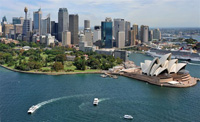FDI optimism: Australia still top choice for Asian investors
AUSTRALIA continues to be the most favoured foreign direct investment (FDI) destination among Asian investors of all Asia Pacific countries – and it is ranked the eighth most popular investment destination globally. That is according to the 2014 Foreign Direct Investment Confidence Index (FDICI) results released this month by global management consulting firm A.T. Kearney from Washington DC.
In a report that is well regarded internationally for providing an in-depth view of forward-looking investment sentiment, A.T. Kearney also found the US has not only maintained its first place position from last year, but also increased the lead it had in the 2013 study, which was referenced in the recent White House report, Winning Business Investment in the United States. 
According to A.T Kearney’s notes on the report, the findings bode well not only for the US, but for the global economy as a whole – almost four out of five respondents are more optimistic about the global economy than they were a year ago.
Since its inception, the A.T. Kearney study has consistently pointed toward top global choices for foreign direct investment, with the top 10 most attractive FDI destinations receiving a majority share of global FDI inflows roughly one year after the survey.
Asia, which attracts roughly a third of all foreign direct investment, has shown particular resilience.
A.T. Kearney's Asia Pacific leader, John Kurtz said, “With investment still pouring into China and with India now on the rise, we notice too the collective strength of ASEAN as an investment destination of choice especially with the coming of the AEC.
“Last year ASEAN total investment outstripped even China and this year's FDICI seems to presage more of the same.”
China is at number two on the index, attracting higher-end manufacturing from overseas and increased inland investments.
India has dropped two notches in the Top 10 to seventh since 2013, the result of a cooling off in investor sentiment in such sectors as multi-brand retail and mining. However, the A.T. Kearney report indicated India’s new government and its Look East policy were expected to further buoy outbound FDI in South East Asia as well as inbound FDI sentiment.
Singapore, with its famously predictable regulations and low corporate tax rate, strengthened its standing in the Top 10 to ninth.
The strongest individual performance on the 2014 study came from Malaysia, which surged 10 points to 15th, benefitting from strong inbound regional FDI flows and good performance in financial services, heavy industry and primary industry.
Founder of the FDI Confidence Index and A.T. Kearney chairman emeritus, Paul A. Laudicina said, “Despite racking volatility and economic uncertainty on a global scale, the findings from the 2014 FDICI suggest that a corner is being turned. Corporations sitting on massive cash reserves are increasingly confident that they can parlay these into productive investments with attractive returns.” 
Other key survey highlights included:
- Despite unresolved deficits in the Eurozone, 11 European countries still rank in the top 25, some entering the ranking for the first time;
- Canada moved into the third spot;
- 39 percent of respondents voiced a more positive sentiment than last year for second-ranked China; and
- Russia, at number 11 last year, fell out of the top 25 rankings, even despite the fact that the survey was fielded prior to the current political problems in Ukraine.
“We feel confident that despite a slow and uneven economic recovery, executives who make FDI decisions are regaining a sense of measured confidence,” said Erik Peterson, A.T. Kearney partner and a co-author of the study.
“The 2014 FDICI is not only an indicator of FDI flows, but an excellent telescope into specific economic stories around the globe. We’re pleased that this year’s study portrays a more optimistic picture globally.”
Mr Peterson said each region has an interesting unfolding story seen through the lens of the FDI Confidence Index, with many of the winners riding on stability after the ongoing post-recession economic turbulence.
In the Americas, Brazil ranked among the top five most preferred FDI destinations for the fourth consecutive year, incentivised by new industrial policy measures.
Mexico, ranked 12th, is a quiet beneficiary of the wave of US reshoring, due to its integration with US supply chains. Chile’s stable economy and investment climate translated to a five-notch climb in the index, to 17th.
The index shows Europe attracts more than a quarter of the world’s total FDI inflows, due to its highly qualified labour force, sophisticated, well-heeled consumers, and world-class infrastructure.
Northern European nations Sweden and Denmark make it to the top 25 for the first time this year, while Belgium and the Netherlands return to the index after some time off investors’ radars.
The UK, amid discussions of a potential opt-out from the EU, rose four positions to fourth.
France, currently under President François Hollande’s efforts to increase the country's competitiveness, has reclaimed a place in the top 10.
BACKGROUND
THE 2014 FOREIGN DIRECT INVESTMENT CONFIDENCE INDEX
The FDI Confidence Index is constructed using primary data from a proprietary survey administered to senior executives of the world’s leading corporations by A.T.Kearney.
Respondents include C-level executives and regional and business heads. The 300 participating companies represent 26 countries and span all industry sectors.
All companies report global revenue of more than $500 million. Companies surveyed are evenly distributed across the globe, with roughly one-third headquartered in Europe, a third in the Asia-Pacific region and a third in the Americas.
The survey was conducted in January and February 2014. While the FDI Confidence Index provides readers with a sense of investor attitudes about the future, it is not designed to reveal specific reasons for the results. This study reflects upon likely causes for upward or downward changes, but the conclusions must be regarded only as considered judgment on the part of A.T. Kearney’s Global Business Policy Council.
The index is calculated as a weighted average of the number of high, medium, and low responses to questions about the likelihood of direct investment in a market over the next three years. Index values are based on non-source-country responses. For example, the index value for the US was calculated without responses from US-based investors. Higher index values indicate more attractive investment targets.
FDI flow figures are the latest statistics available from the United Nations Conference on Trade and Development (UNCTAD). Other secondary sources include investment promotion agencies, central banks, ministries of finance and trade, and major periodicals.
For past editions of the FDICI: www.atkearney.com/gbpc/foreign-direct-investment-confidence-index
A.T. Kearney is a global partnership organisation that focuses on problem solving for international businesses by assisting with collaboration across borders to co-create sustainable results. Operating since 1926, A.T. Kearney has worked as trusted advisors on what it calls “most mission-critical issues” to the world’s leading organisations across all major industries and service sectors, and today has 59 across 40 countries.
ends

 How to resolve AdBlock issue?
How to resolve AdBlock issue?